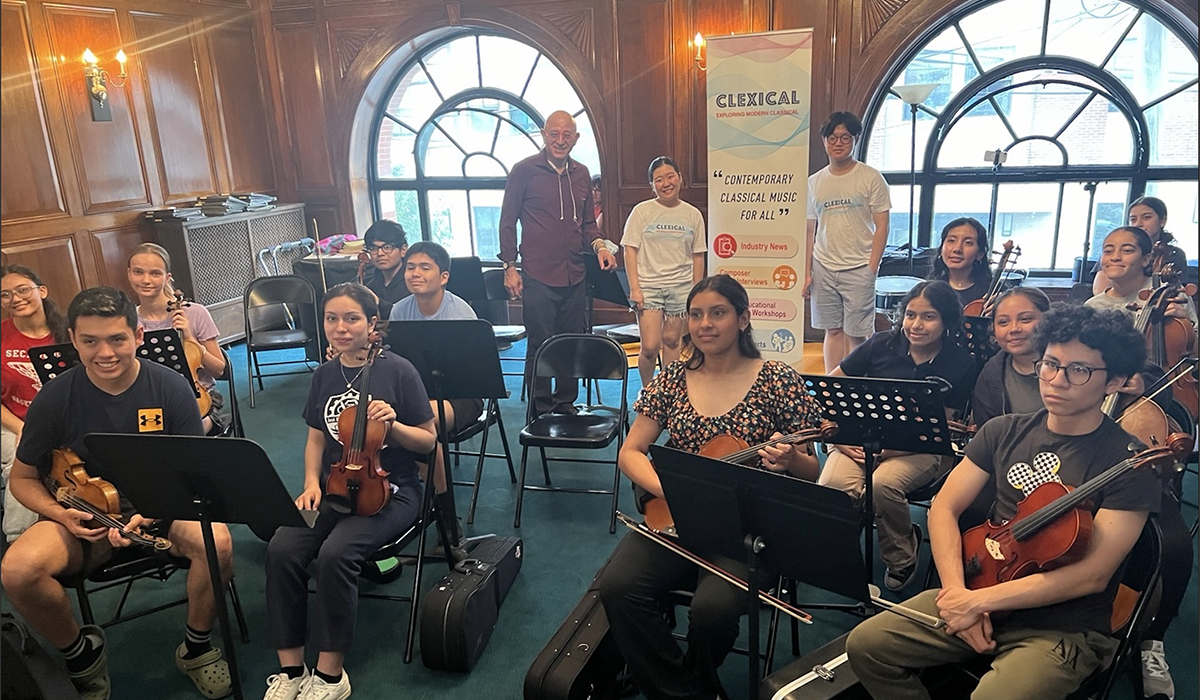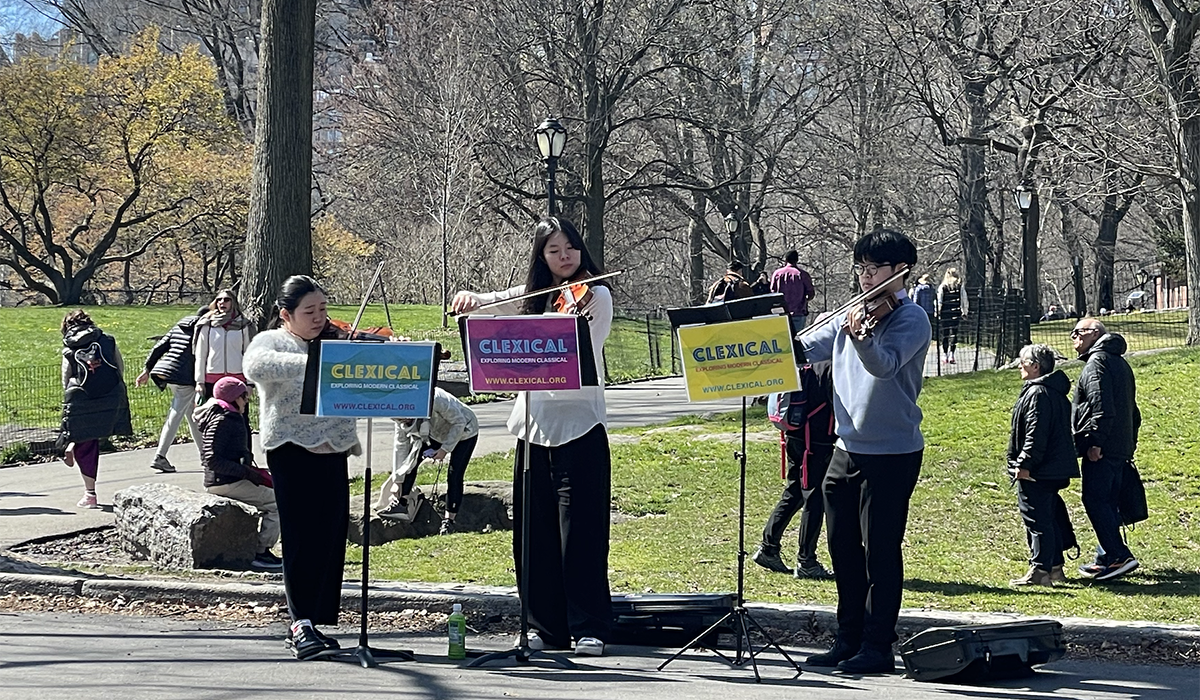Amplifying Voices Through Strings and Service

Meet Daily Point of Light Award honoree Edward Lee. Read his story, and nominate an outstanding volunteer or family as a Daily Point of Light.
Edward Lee is using the power of music not just to perform, but to connect, heal and uplift communities. Through his work with El Sistema and his own organization, Clexical, he brings contemporary classical music to those who may otherwise never experience it—young musicians from underserved backgrounds, seniors in community centers and curious park-goers alike. Edward’s passion for accessibility in the arts fuels a mission that reaches beyond the concert hall.
As a teacher with El Sistema, Edward dedicates his time to guiding young musicians, many of whom come from under-resourced communities. He sees music not only as an art form but as a vehicle for empowerment and self-expression. His mentorship provides students with technical training, but more importantly, it opens doors to confidence, discipline and a lifelong love of the arts.
In his role as co-founder and director of outreach at Clexical, Edward has created a student-led platform that brings contemporary classical works into unexpected spaces. From public parks to senior centers, these concerts feature living composers and diverse cultural voices. By taking music out of elite institutions and into everyday spaces, Edward is fostering a sense of belonging and inclusion in classical music, an art form that has often felt out of reach for many.
Beyond performance, Edward’s commitment includes deep community engagement. He leads interviews with composers, curates inclusive concert programs and coordinates outreach that encourages multigenerational dialogue. His events invite audiences to not only listen but to reflect and connect, making the experience of music both personal and communal. His approach transforms concerts into conversations. Edward’s efforts are helping to redefine what classical music can be—and who it’s for. By championing innovation, access and education, he is building a more inclusive future for the arts.
Tell us about your volunteer role.
As a co-founder and volunteer with Clexical, I work on projects that try to make contemporary classical music feel more approachable for young people and communities who might not run into it otherwise. I coordinate and do interviews with composers from all over, focusing on their creative processes and the personal stories behind what they write. I also help put together workshops and concerts specifically for kids who don’t usually get access to new music, so they can listen, ask questions and even try their hand at composing.
Beyond the events, I spend time gathering and sharing resources like lesson materials, recordings and articles that can help people explore today’s contemporary classical scene, whether they’re musicians or not. Really, it’s all about trying to build a community around new music where people actually feel welcome and excited to be there.
Why is this issue so important to you?
This topic is particularly important to me because I grew up watching gifted musicians I knew just close themselves off from a whole world of music. It was literally somewhat heartbreaking to watch people I knew were so musical write off modern classical as too strange or intellectual before they’d even really given it a shot.
What really struck me was that this music is speaking for our generation, including our experiences and struggles; yet many people my age don’t seem to make the connection. They are ignoring composers who are grappling with the same issues, just expressing these feelings in sound instead of words. Also, I think there is something deeper about our connection with art that challenges us. When people reject new classical music, they are often dismissing anything that isn’t instantly appealing to them. Yet, some of the most meaningful experiences I have had have come from sitting with something I didn’t know until it finally struck a chord.
This is what makes this issue personal for me. I don’t want people to miss the feeling of discovery, the awareness that something one might have assumed was “not for them” is actually intensely applicable to their life. Contemporary classical music deserves to be part of the conversation about what young people are listening to and connecting with.

What inspired you to get started with this initiative?
My interest in starting Clexical began with the realization that many people, even extremely gifted young musicians, felt completely alienated from modern classical music. In rehearsals and casual conversations, I often heard my colleagues refer to this music as strange or inaccessible, or claim that it was written only for “serious” professionals who could properly appreciate it. But from my own experiences of playing new works and hearing composers speak about their creative processes, I knew the energy and humanity that existed in this music.
But the actual turning point was when this composer visited my orchestra to present a piece we were rehearsing. They discussed the memories and feelings and personal experience that they had put into composing it, and all of a sudden, everything fell into place for me. What had been abstract suddenly was so real and personal. I could tell some of the other musicians were having similar experiences, but for me, it was like this total change in the way I perceived the music.
It struck me that when people do get the backstories of modern works, the music no longer seems so distant and becomes something truly personal. That’s how Clexical was born. I was hoping to create a means of getting these voices and stories to more individuals and make modern classical music seem close and relevant rather than scary.
What have you learned through your experiences volunteering?
Through my work with Clexical and other volunteer experiences, I’ve learned that service really works when it’s about building actual relationships with people, not just giving them resources. With music outreach, I’ve seen how when you tailor performances to what different communities actually want, it completely changes how they see the arts. Instead of feeling like something that’s not for them, it becomes personal and relevant. When I’ve done education-focused volunteering, I’ve had to learn to listen first. You really have to understand what people need before you jump in with your ideas about how to help. I’ve definitely learned that the hard way because sometimes what I thought would be helpful wasn’t what they were looking for at all.
What I’ve realized across all my volunteer work is that meaningful change usually starts small. It’s things like having a conversation with someone in their first language, or sharing stories about where we come from, or just being there when someone needs a bit of encouragement. Those moments often end up meaning more than all the big, organized efforts. Volunteering has taught me to approach things with empathy first and to stay humble when I need to change my approach. I’ve also learned that you can’t just measure success by how many people you reach. The real measure is the connections you actually make with people.
What are your long-term plans or goals for the organization?
I’m really excited about where Clexical can go in the next few years. Right now we’re planning these concerts with our ensemble; it’s made up of several of our members who perform new music by both student composers and established living composers. Those performances are going to be huge for showing people that contemporary classical music isn’t just something you study, it’s something you can actually experience live and connect with.
We’re also expanding our workshops for kids, which I’m passionate about. The goal is to reach more communities that don’t usually get exposure to contemporary music. I also think there’s real potential to partner with schools and community centers to make this kind of programming more regular, not just one-off events. The dream would be for contemporary classical music to feel as accessible and exciting to young people as any other genre they’re discovering. I want people to walk away from our events thinking, “I had no idea this music could speak to me like that.”
What’s been the most rewarding part of your work?
One of the most rewarding parts of my work with Clexical has been getting to interview composers from all these different backgrounds and musical styles. Each conversation really gives you this window into how they create, what challenges they’ve had to deal with and what actually drives their work. I’ve talked with artists who are mixing classical music with electronic sounds, composers who pull from their cultural background to create these totally new musical languages and people who are completely redefining what contemporary music can even be.
Hearing their stories directly has really opened my eyes to how diverse this field actually is. It’s also given me new ways to think about making music more accessible to people. When I share these interviews with audiences and watch them connect to the actual human stories behind the music, it’s honestly both inspiring and affirming. You realize that people really do want to understand the person behind the work, not just hear the final product.
Why is it important for others to get involved with causes they care about?
Getting involved with causes you care about is really what turns passion into actual action. It’s one thing to believe in an issue from a distance, but it’s totally different when you roll up your sleeves and work to address it directly. Through my experience with Clexical, I’ve seen how even small efforts can create these ripple effects, like helping one person who really needs it or getting others motivated to jump in too.
What I’ve realized is that volunteering gives you this perspective you just can’t get from watching on the sidelines. It really builds your empathy and helps you actually understand what other people are going through. You also see what happens when a community comes together. When people commit their time to something they genuinely care about, they’re doing way more than just solving a problem. They end up building these real connections and growing as people. Plus, they’re proving to others that change is actually possible.
Any advice for people who want to start volunteering?
Honestly, my advice would be to start by exploring what’s already happening around you. Look at your school, your neighborhood, local nonprofits. Sometimes the best opportunities are right under your nose and you just haven’t noticed them yet. Don’t overthink it either. A lot of people get stuck trying to find the “perfect” volunteer opportunity, but you can learn just as much from something that ends up not being a great fit. That’s valuable information too.
One thing I’d suggest is talking to people who are already volunteering. Ask them about their experiences, what they like, and what’s challenging. You’ll get a much better sense of what different types of volunteer work involve beyond what you see on websites. Also, consider your schedule realistically. It’s better to commit to something small that you can actually stick with than to overcommit and burn out after a month. Consistency matters way more than the number of hours you put in initially.
And if you’re feeling nervous about jumping in, see if you can bring a friend. Having someone you know there can make the whole experience less intimidating, plus you’ll have someone to process the experience with afterward. The biggest thing is just accepting that you won’t know if something’s right for you until you actually try it. You can research all you want, but volunteering is one of those things where you really learn by doing.
Do you want to make a difference in your community like Edward? Find local volunteer opportunities.